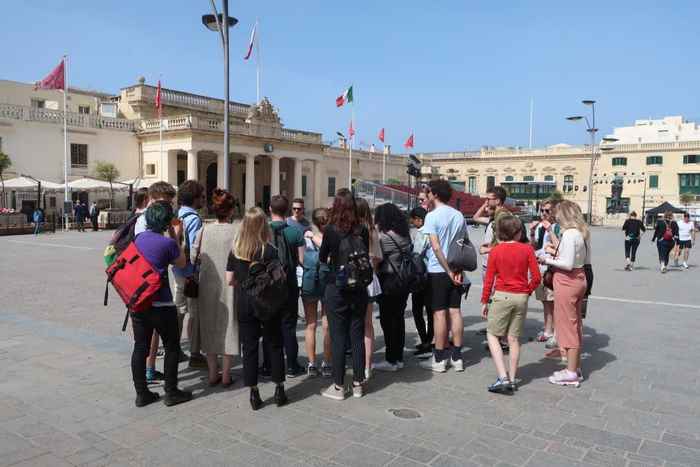Study programme
Programme structure
The Master's in Identity and Integration comprises 60 ECTS credits: 18 credits for core courses; 24 credits for electives; and 18 credits for a Master’s thesis.
-
Imagining the Nation: Cultures of NationalismPeriod 16
-
Imagining Europe: Ideologies and PowerPeriod 26
-
Skills Seminar: European Capitals of CulturePeriod 36
-
Restricted-choice electives: Identity and IntegrationPeriod 1Period 2Period 4Period 512
-
Free-choice electivesPeriod 1Period 2Period 4Period 5Period 612
-
Master's Thesis European StudiesPeriod 4Period 5Period 618
-
Core courses
- Imagining the Nation: Cultures of Nationalism. This course offers a comparative cultural history of Europe with a focus on nation-building in the past two centuries, and on the intellectual history of national culture and nationalism;
- Imagining the Nation: Ideologies and Power. This course discusses contested identities and ideas for integration studies the diversity of European thought, of competing ideas about European identity, of schemes for European unity, as well as the ways in which such ideas were communicated across Europe.
- Skills Seminar. European Capitals of Culture studies the EU ECOC programme. Students gain knowledge about EU’s cultural policies and train their more practical skills by organising and programming a symposium with expert speakers and a study trip to the European Cultural Capital.
-
Electives
The electives complement the core courses of Identity and Integration. They add to the interdisciplinary approach to studying European culture and history and allow students to pursue specific interests in terms of themes, periods, regions and methods.
It is required to take at least two 'resticted-choice electives' which are bound to the Identity and Identity programme (equal to a total of 12 ECTS). The other two electives can be 'free electives', chosen from the offer of courses of the European studies Deparment or the Faculty of Humanities at large.
-
Internship
We enable students to do an internship during the MA programme. They can do an internship as part of their programme for 6 to max. 12 ECT if the internship comprises an academic component which fits within the framework of the programme. Students can also choose to do a non-academic internship as additional to your programme, which will not be credited. In both cases, the student is responsible for organizing the internship and should do so in consultation with the programme coordinator.
-
Excursion
In the second semester of the academic year, the students will make a trip to one of Europe’s cultural capitals. In preparation they will organize a symposium with experts from outside the academic world to discuss the policies and practices of EU’s cultural capitals programme. In recent years, we have visited among others the cities of Aarhus, San Sebastián and Valletta.

Valetta Study Trip (2018) -
Tutoring
All students will be appointed a tutor who will support them in academic matters and help them fulfill their potential. The tutor will plan plenary and individual meetings to discuss study experiences, progress, thesis ideas or career plans. Throughout the year, students can also contact their tutor for questions regarding the curricular aspects of the Master’s program.
-
Thesis
You complete the Identity and Integration programme by executing your own in-depth research project. We will help you find a suitable thesis supervisor. Upon completion, you will have gained profound understanding of the complexity of a theme of your own choice and you will have mastered the necessary skills to conduct independent research in this field.

Our programme explores contemporary intersections between culture and polity, media and identity, and race and state. Given the recent resurgence of nationalism worldwide and the increasing popularity of radical right- and left-wing parties, it is vitally important to understand the tensions between the global and the local that find expression in issues such as nationalism, populism, identity politics, and social media.Dr Krisztina Lajosi
-
How does this Master’s programme differ from European Studies programmes at other universities?
European studies at the UvA stands out for two reasons. First of all, this Master takes a multidisciplinary approach to studying Europe. In comparison to many other programmes in European studies which mainly focus on EU-politics, we try to render justice to Europe’s complexity – its multi-layered governance, its cultural diversity etc. – by combining perspectives from politics, economics, law, history, culture, anthropology and geography. Secondly, as European studies at the UvA is embedded in the humanities, we explore how history and culture in particular contribute to the understanding of Europe and its (dis)contents.
-
Can I take language courses?
Yes, it is possible to take language courses offered by the language departments of the UvA. However, you will not get academic credits for these courses.
-
I hesitate between two tracks (e.g. East European Studies and Identity & Integration): can I do a mixture of both?
You need to register for one of the tracks, which both have their own core programmes. It is nevertheless possible to study at the cross-roads of two tracks, because many electives are open for students from all three Master tracks. This means that you can practically tailor your programme to your own interests.
-
Can I do this Master’s part time and take two years to accomplish the programme?
The programme is designed as a one-year programme and is not meant for part time studying. Nevertheless, it is possible to extend the programme over a two-year period. You can best contact the track coordinator in order to discuss and organize your study schedule.